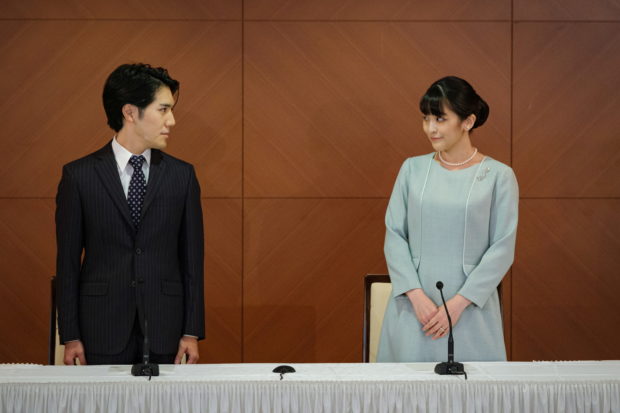
Japan’s Princess Mako and her husband Kei Komuro attend a news conference to announce their wedding at Grand Arc Hotel in Tokyo, Japan, October 26, 2021. Nicolas Datiche/Pool via REUTERS
TOKYO — Japan’s Princess Mako, the niece of the emperor, married college sweetheart Kei Komuro on Tuesday, giving up her royal title and saying she was determined to build a happy life with her “irreplaceable” husband after a tumultuous engagement.
In an unusually frank joint news conference with her new husband, Mako said “incorrect” news reports about Komuro had caused her great sadness, stress, and fear.
She was diagnosed with post-traumatic stress disorder (PTSD) earlier this year after a four-year engagement plagued by money scandals and intense media scrutiny.
“I’m aware that there are various views on our marriage. I feel very sorry for those (for) whom we have caused trouble …,” said Mako, who will from now be known as Mako Komuro, having had to give up her royal title after marrying a commoner, in line with Japanese law.
“For us, marriage is a necessary choice to live while cherishing our hearts.”
The two, 30, were married in the morning after an official from the Imperial Household Agency (IHA), which runs the family’s lives, submitted paperwork to a local office registering their marriage.
The couple broke with tradition by foregoing the rituals and ceremonies usual to royal weddings, including a reception, while Mako also refused the one-off payment of about $1.3 million typically made to royal women who leave the imperial family after marriage.
Japan initially cheered the couple’s engagement announcement four years ago, but things turned sour soon after, when the tabloids reported on a money scandal involving Komuro’s mother, prompting the press to turn on him and the marriage to be postponed. Komuro left Japan for law studies in New York in 2018 only to return in September.
During the press conference, Komuro said he loved Mako and pledged to support and protect her, unusually open language for anyone connected to Japanese royalty.
“I want to spend the only life I have with the one I love,” he said.
Television footage earlier showed Mako, wearing a pastel dress and pearls, saying goodbye to her parents and 26-year-old sister, Kako, at the entrance to their home. Though all wore masks in line with Japan’s coronavirus protocol, her mother could be seen blinking rapidly, as if to fight off tears.
Though Mako bowed formally to her parents, her sister grabbed her shoulders and the two shared a long embrace.
Japan’s Princess Mako and her husband Kei Komuro (not seen) attend a news conference to announce their marriage registration at Grand Arc Hotel in Tokyo, Japan, October 26, 2021. Nicolas Datiche/Pool via REUTERS
Komuro, dressed in a crisp dark suit and tie, bowed briefly to camera crews gathered outside his home as he left in the morning but said nothing. His casual demeanor on returning to Japan, including a ponytail that was cut before the marriage, had sent tabloids into a frenzy.
Money scandal
Just months after the two announced their engagement at a news conference where the smiles they exchanged won the hearts of the nation, tabloids reported a financial dispute between Komuro’s mother and her former fiance, with the man claiming mother and son had not repaid a debt of about $35,000.
The scandal spread to mainstream media after the IHA failed to provide a clear explanation. In 2021, Komuro issued a 24-page statement on the matter and also said he would pay a settlement.
Public opinion polls show the Japanese are divided about the marriage, and there has been at least one protest.
Analysts say the problem is that the imperial family is so idealized that not the slightest hint of trouble with things such as money or politics should touch them.
The fact that Mako’s father and younger brother, Hisahito, are both in the line of succession after Emperor Naruhito, whose daughter is ineligible to inherit, makes the scandal particularly damaging, said Hideya Kawanishi, an associate professor of history at Nagoya University.
“Though it’s true they’ll both be private citizens, Mako’s younger brother will one day become emperor, so some people thought anybody with the problems he (Komuro) had shouldn’t be marrying her,” Kawanishi added.
The two will live in New York after Mako applies for the first passport of her life.